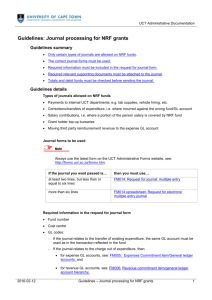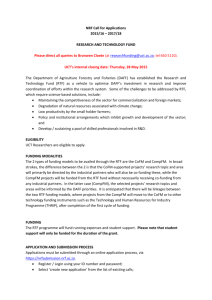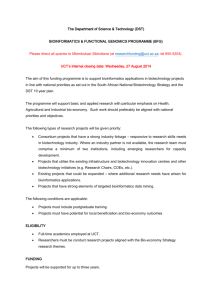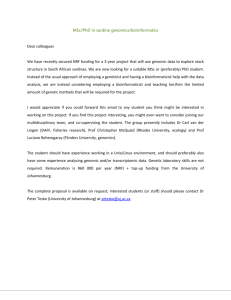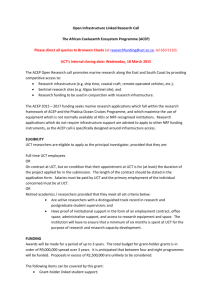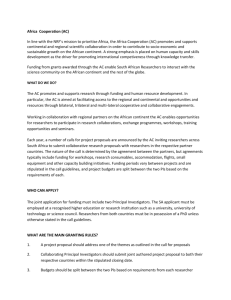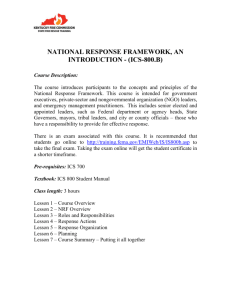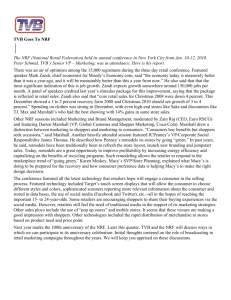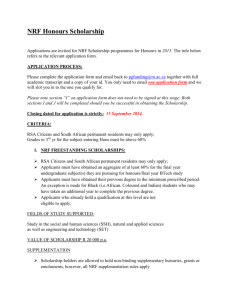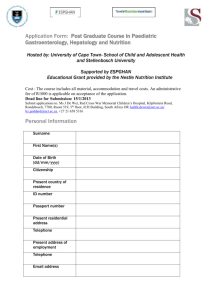government agency funding
advertisement
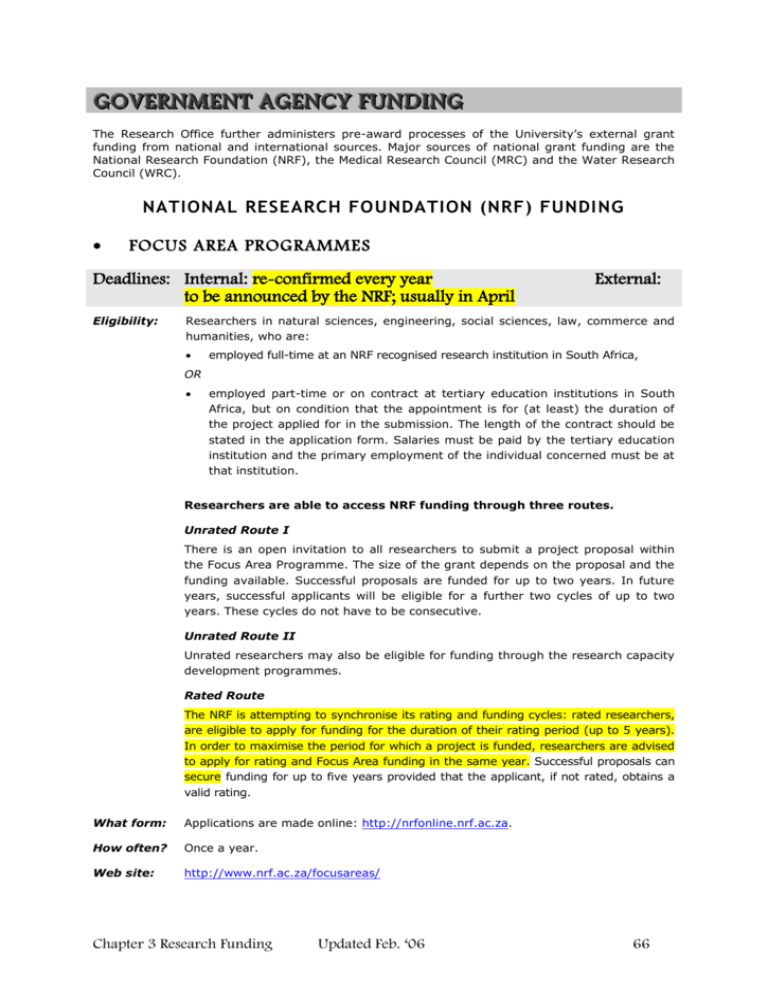
G GO OV VEERRN NM MEEN NTT AAG GEEN NC CYY FFU UN ND DIIN NG G The Research Office further administers pre-award processes of the University’s external grant funding from national and international sources. Major sources of national grant funding are the National Research Foundation (NRF), the Medical Research Council (MRC) and the Water Research Council (WRC). NATIONAL RESEARCH FOUNDATION (NRF) FUNDI NG FOCUS AREA PROGRAMMES Deadlines: Internal: re-confirmed every year to be announced by the NRF; usually in April Eligibility: External: Researchers in natural sciences, engineering, social sciences, law, commerce and humanities, who are: employed full-time at an NRF recognised research institution in South Africa, OR employed part-time or on contract at tertiary education institutions in South Africa, but on condition that the appointment is for (at least) the duration of the project applied for in the submission. The length of the contract should be stated in the application form. Salaries must be paid by the tertiary education institution and the primary employment of the individual concerned must be at that institution. Researchers are able to access NRF funding through three routes. Unrated Route I There is an open invitation to all researchers to submit a project proposal within the Focus Area Programme. The size of the grant depends on the proposal and the funding available. Successful proposals are funded for up to two years. In future years, successful applicants will be eligible for a further two cycles of up to two years. These cycles do not have to be consecutive. Unrated Route II Unrated researchers may also be eligible for funding through the research capacity development programmes. Rated Route The NRF is attempting to synchronise its rating and funding cycles: rated researchers, are eligible to apply for funding for the duration of their rating period (up to 5 years). In order to maximise the period for which a project is funded, researchers are advised to apply for rating and Focus Area funding in the same year. Successful proposals can secure funding for up to five years provided that the applicant, if not rated, obtains a valid rating. What form: Applications are made online: http://nrfonline.nrf.ac.za. How often? Once a year. Web site: http://www.nrf.ac.za/focusareas/ Chapter 3 Research Funding Updated Feb. ‘06 66 Purpose: To provide comprehensive research grants for research relevant to South Africa, within the following focus areas: Distinct South African Research Opportunities Economic Growth and International Competitiveness Conservation and Management of Ecosystems & Biodiversity Education and the Challenges for Change Challenge of Globalisation: Perspectives from the Global South Information and Communication Technology and the Information Society in South Africa Indigenous Knowledge Systems Sustainable Livelihoods and the Eradication of Poverty Unlocking the Future: Advancing and Strengthening Strategic Knowledge Contact: Research Office Department of Research & Innovation External Grants Manager Tel: 650 2431 Fax: 650 5768 E-mail: esauh@bremner.uct.ac.za OR External Grants Assistant Tel: 650 5204 E-mail: hfaulman@bremner.uct.ac.za Notes Chapter 3 Research Funding Updated Feb. ‘06 67 TECHNOLOGY & HUMAN RESOURCES FOR INDUSTRY PROGRAMME (THRIP) Deadline: Internal: re-confirmed every year External: to be announced by the NRF. Calls usually open in August/September and close in October/November each year. What form: Applications are made online: http://nrfonline.nrf.ac.za. How often? Once a year. Web site: http://www.nrf.ac.za/thrip/index.htm Purpose: To foster collaboration between industry and higher education institutions, by matching industry contributions to research. Conditions: The following funding mechanisms are available: Industry partners and THRIP invest jointly in research projects where project leaders are on the academic staff of South African Higher Education Institutions (HEIs). THRIP matches investment by industry in innovative research projects where researchers/experts from Science, Engineering and Technology Institutions (SETIs) serve as project leaders and students are trained through the projects. Technology Innovation Promotion through the Transfer Of People (TIPTOP) schemes promote the mobility of researchers and students between the industrial participants, HEIs, and SETIs involved in joint projects. Four TIPTOP schemes are available. These are: 1. The exchange of researchers and technology managers between HEIs, SETIs and industry. 2. The placement of SET graduates in firms, while they are working towards a higher degree on a joint research project. 3. The placement of SET graduates in small, medium and micro enterprises (SMMEs). 4. The placement of SET skilled company employees within HEIs or SETIs. Contact: Research Office Department of Research & Innovation External Grants Manager Tel: 650 2431 Fax: 650 5768 E-mail: esauh@bremner.uct.ac.za OR External Grants Assistant Tel: 650 5204 E-mail: hfaulman@bremner.uct.ac.za THRIP SERVICE CENTRE (TSC) The TSC will provide an optional free service with assistance for the following: Drawing up a budget (budget template available on the web at UCT Admin Forms, R&I19, or electronically in Excel from TSC) Project information, for example, student IDs Assistance with the online application form, including limited assistance to industry partners Proof of Payments (PoPs) Financial reporting to THRIP Advice about matching expenditure to budget Contactable on thrip@uct.ac.za Chapter 3 Research Funding Updated Feb. ‘06 68 The service will not include the day-to-day management of budgets, but will assist in setting up systems in the research group and/or department. TIPTOP OPTIONS Technology Innovation Promotion through the Transfer of People (TIPTOP) represents a set of placement mechanisms to promote mobility of people participating in THRIP projects among the organisations involved in the projects (HEIs; SETIs; and industrial laboratories). These TIPTOP options will be fully embedded in THRIP projects. This means that either an HEI-based or SETI-based researcher will act as leader of a THRIP project in which one or more TIPTOP placements may be included. When TIPTOP placements are made at firms abroad, the researcher/graduate will be contractually obliged to be employed by an organisation in South Africa directly after completion of the TIPTOP contract, and remain in the employ of a South African-based organisation at least for a period equivalent to the length of the TIPTOP contract. TIPTOP Option 1: Exchange of researchers and technology managers between HEIs, SETIs and industry THRIP will provide support for academic researchers in HEIs to work in industrial laboratories for a predetermined period. Reciprocally, THRIP will encourage and support industrial researchers and technology managers to be temporarily seconded to a HEI/SETI to conduct research of direct relevance to the industry involved. In both these instances THRIP and the specific industry involved will contribute to the salary cost of the researcher (whether from industry or an HEI), as well as his/her relocation and travelling cost for the period of the TIPTOP contract, according to the TIPTOP funding formulae. TIPTOP Option 2: Placement of SET graduates in industry, while they are working towards a higher degree on a joint research project This TIPTOP option will support the placement of graduates in SET-related disciplines within industry (either large or SMMEs) on a contract basis for a fixed period, to work on THRIPapproved research or technology development projects within the firms. The graduate should be registered at an HEI for a higher degree in SET. Active mentorship of each graduate by both an academic supervisor and the graduate’s superiors within a firm will form an integral part of this placement scheme. This support will be for a maximum of two years for a master’s degree and three years for a doctoral degree. TIPTOP Option 3: Placement of SET graduates in SMMEs This option is exclusive to SMMEs in South Africa, and would enable the placement of graduates in SET-related disciplines within SMMEs on a contract basis for a fixed period, to a maximum of two years, to work on THRIP-approved research or technology development projects within the firms. Only individuals who have graduated (either undergraduate or post-graduate degree/diploma) not more than five years prior to commencement of the contract would qualify for participation in TIPTOP 3. It is not expected from the graduate to be enrolled for a higher degree (TIPTOP 3 is the only option with this concession). Active mentorship of each graduate by both an academic supervisor and the graduate’s superiors within a firm will be facilitated and monitored by the THRIP secretariat. TIPTOP Option 4: Placement of SET-skilled company employees within HEIs or SETIs This option will support the secondment of graduate employees from industry to HEIs/SETIs to do research within THRIP projects while studying towards a higher degree. The secondments can be for either newly-recruited employees (which THRIP strongly encourages) or longer serving employees. This support will be for a maximum of two years for a master’s degree and three years for a doctoral degree. Chapter 3 Research Funding Updated Feb. ‘06 69 INNOVATION FUND Deadline: No fixed annual deadline. Eligibility: Project leader must be South African or a permanent resident, while the lead institution must be South African. What form: No form, but strict criteria for the content of Pre-proposal and Proposal documents. How often? Calls for proposals are published at different times. Current calls are: TAP (open-ended): to build on the existing research and knowledge base, enabling research to progress to the prototype stage or equivalent; most projects involving UCT would be expected to fall into this category; MiTech (open-ended): to support the accelerated development of high risk, market driven, enabling technology in all economic sectors; partnership with industry is a pre-requisite; Special calls restricted to specific focus areas are opened on an ad hoc basis. Web site: http://www.innovationfund.ac.za/ Purpose: Provides grants to fund the end-stage research process where research knowledge can be translated into new and improved products, processes or services. The initiative aims to have national benefit through improving the quality of life of all South Africans, developing human resources, strengthening the country’s competitiveness as well as enhancing economic growth. Conditions: Preference is given to proposals that have significant potential to: expand existing commodity sectors; facilitate the migration of existing industries to new added value areas, or create new leveraged industries from existing industries; enable the establishment of new or emerging high R&D intensive industries; create new opportunities for historically disadvantaged groups, and involve within a consortium arrangement the appropriate combination of research, business, NGO & BEE partners to achieve the national benefit. Process: The Grant Funding Process consists of the following phases: 1) Call for Preproposals, a 10-page submission subject to a specific template and strict guidelines, 2) Pre-proposal Evaluation, 3) Site Visit, 4) Call for Full Proposals, 5) Full Proposal Evaluation, 6) Steering Committee Meeting/ Approval, 7) Project Monitoring. Funding: Project Funding is subject to annual milestones being achieved and is limited to a specified period: TAP: up to R5 million per year for 3 years; MiTech: up to R3 million per year for 5 years. Contact: UCT Innovation Department of Research & Innovation Intellectual Property Manager Tel: 650 2425 Fax: 650 5778 E-mail: Rosemary.Wolson@UCT-Innovation.co.za OR Intellectual Property Assistant Chapter 3 Research Funding Updated Feb. ‘06 70 THUTHUKA PROGRAMME Deadline: Internal: re-confirmed every year External: to be announced by the NRF. Normally in July/August of each year. Eligibility: All South African UCT permanent academic staff and T3 contract appointees on academic conditions of service. This includes those UCT academic staff in the Faculty of Health Sciences who are on joint staff of UCT and PGWC. It would not include Registrars or permanent residents. What form: Applications are made online: http://nrfonline.nrf.ac.za. How often? Once a year. Web site: http://www.nrf.ac.za/thuthuka/ Purpose: Focused on research capacity development, to improve the qualifications of women, black and disabled new researchers and to accelerate the progression of this group into mainstream research support opportunities. Conditions: This programme is a funding partnership between the NRF and UCT. Hence, all budgets and applications need to be prepared in conjunction with UCT’s Research Office. Three sub-programmes exist: Researchers-in-Training Support for new researchers who are registered for a Doctoral degree. The primary, but not sole, component of individual development is thus the attainment of a higher qualification. Age limit: 45 years. Women-in-Research To support women researchers in the advancement of their research careers, to enable them to become more representative and contribute to research discourses. Eligibility is restricted to women researchers with a PhD and no rating. There is no strict age limit. Research Development Initiative for Black Academics (REDIBA) To prepare black South African scientists for positions of scientific and academic leadership, thereby diversifying, strengthening and sustaining the nation's research capabilities. Eligibility is restricted to black postdoctoral researchers without a rating, employed at historically white universities. Contact: Research Office Department of Research & Innovation External Grants Manager Tel: 650 2431 Fax: 650 5768 E-mail: esauh@bremner.uct.ac.za OR External Grants Assistant Tel: 650 5204 E-mail: hfaulman@bremner.uct.ac.za Chapter 3 Research Funding Updated Feb. ‘06 71 EQUIPMENT GRANTS The Equipment Programme of the NRF comprises two components: 1. CAPITAL EQUIPMENT GR ANTS The NRF will publish calls for applications for major capital equipment applications 2. MOBILITY AND TRAININ G GRANTS Provided to enable access to equipment or specialised training Deadline: Eligibility: At least one call a year, deadline revised annually. call dependent on funding availability First call deadline: mid March; Second call: approximately August Second Applicants do not require an NRF rating. Supervisors may apply on behalf of Masters or PhD level students, but the students’ details should also be included. Should a student apply independently, he/ she must indicate the Supervisor’s details. What form: First call in 2006: hard copy forms available from the Research Office. Future calls: online application accessible at http://nrfonline.nrf.ac.za. Purpose: Mobility grants may be used for both local and overseas visits to utilise research equipment not available at UCT. The grant will fund user time on the facility/equipment and makes a contribution towards travel costs. Training grants may be used for both local and overseas courses. The NRF attempts to fund primarily the training course fees, and makes a contribution towards travel costs. Conditions: A maximum visit of 21 days is permitted. Anything longer than this is regarded as being an extended visit (not ad hoc) and will not be funded as a Mobility or Training Grant. The applicant's institution is expected to contribute towards accommodation and daily allowance as per their own standard rates. This support should come from the applicant’s faculty and must be clearly indicated in the application budget. The minimum requested amount is R7 500 (this amount excludes the institution’s contribution towards accommodation and daily allowance). Mobility Grants cannot be used to support conferences, workshops or “investigative visits”. International collaboration is not necessarily a motivation unless the equipment is not available in your own institution. In the case of an advanced technique, this should be discussed fully in the application and plans for knowledge transfer indicated. The Training Grant Scheme does not support basic Supplier Training which should be included as a courtesy following the installation of new equipment or in the case of a new operator/ technician. If this is not the case, the NRF expects the Institution to bear the costs for the initial courses. In the case of an advanced technique, this should be discussed fully in the application. Benefit and knowledge transfer should be indicated. Chapter 3 Research Funding Updated Feb. ‘06 72 Adequate proof and motivation must be provided in the case of local and, especially, overseas visits. This motivation must address whether the applicant has ascertained the status and availability of local equipment (mobility grants) and local training courses (training grants) before contacting the overseas facility. This section is MANDATORY. The NRF prefers to support local equipment and research development. Indication of knowledge transfer to the local research community as a result of the visit is a strong recommendation. Proof of student involvement and benefit must be provided. Applications may not be made retrospectively, but can be made in advance for visits up to the end of 2007. In the case of multiple applicants for the same project, all applicants’ details should be included on one form (copy and paste relevant sections), and the budget adjusted accordingly. Unsigned applications will not be accepted. Contact: Research Office Department of Research & Innovation External Grants Manager Tel: 650 2431 Fax: 650 5768 E-mail: esauh@bremner.uct.ac.za OR External Grants Assistant Tel: 650 5204 E-mail: hfaulman@bremner.uct.ac.za Notes Chapter 3 Research Funding Updated Feb. ‘06 73 INTERNATIONAL SCIENCE LIAISON (ISL) There are 2 kinds of ISL grants available: 1. Bilateral Programmes – these run to deadlines 2. Travel grants – for now, these applications are submitted on an ad hoc basis, at least 3-4 months prior to travel. Only funds keynote speakers, research visitors to UCT for longer than 2 months, or UCT staff visiting elsewhere for research purposes for longer than 2 months. Deadline: Eligibility: Bilateral programmes: Various. Travel grants: ad hoc (no deadlines) Bilateral programmes: Can change under each agreement. Travel grants: permanent academic staff What form: Different forms for each type of application, available from the NRF or UCT’s Research Office. Web site: http://www.nrf.ac.za/services/isl/ Purpose: Bilateral Programmes Agreements are drawn up between the South African government and its international counterparts in numerous countries to facilitate the exchange of research information and personnel. These include China, France, Germany, Hungary, India, Italy, Norway, Poland, Japan, the UK, the Russian Federation, Sweden and the USA. Since new bilaterals are in the process of being negotiated, please contact the Research Office for an updated list. Travel Grants These can take the form of Research Visits Abroad, Foreign Research Fellowships, and Keynote Speakers from Abroad. The maximum amount awarded to successful applicants is 50% of the requested budget. The University undertakes to top-up successful applications with 10% of the requested budget to a maximum of R10,000.00. Research Visits Abroad These grants are intended to enable local research fellows to visit research organisations or attend training courses abroad. The maximum support in this category is an economy class return airfare plus subsistence for the visit, which must be longer than 2 months in duration (for shorter visits refer Short Course/Short Research Visit applications under Internal Funding). Foreign Research Fellowships A number of fellowships are available each year to enable local institutions to invite research leaders from abroad to enrich local expertise in their field and promote future collaboration. These visits must be longer than 2 months in duration. Applicants must show that the visiting fellow will benefit not only the host institution, but also the broader scientific community (for shorter visits refer Visiting Scholar/Lecturer Fund under Internal Funding). Keynote Speakers from Abroad Applications can be made to the NRF to contribute towards the cost of an invited international speaker at a conference/ workshop/seminar. The maximum NRF support in this category is an economy class return airfare plus subsistence. Funding is generally given for travel and subsistence, but this changes according to each agreement. Under some of the bilateral programmes, funding for running costs as well as equipment is available. Conditions: The minimum duration for each of the visits in the categories of Research Visits Abroad and Foreign Research Fellowships is 2 months. [delete ‘and Keynote speakers from abroad’] Chapter 3 Research Funding Updated Feb. ‘06 74 Contact: Research Office Department of Research & Innovation External Grants Manager Tel: 650 2431 Fax: 650 5768 E-mail: esauh@bremner.uct.ac.za OR External Grants Assistant Tel: 650 5204 E-mail: hfaulman@bremner.uct.ac.za CENTRES OF EXCELLENCE (COE) The National Research and Development Strategy identifies the need to create "centres and networks of excellence" in science and technology, including in the social sciences, as a key component of the human capital and transformation dimensions of government policy. It is envisaged that such centres will stimulate sustained distinction in research while simultaneously generating highly qualified human resource capacity in order to impact meaningfully on key national and global areas of knowledge. While recognising that the Department of Science and Technology may from time to time create additional centres of excellence, in order to meet its own specific strategic objectives, the National Research Foundation is the main implementer of this strategic initiative. Source: http://www.nrf.ac.za/centres/index.html Further calls for Centres of Excellence applications to be announced by the NRF Additional documents available from the Research Office Guide to the Funding of Centres of Excellence (February 2004) Handbook to assist with the operation of a Centre of Excellence (April 2004) Contact: Research Office Department of Research & Innovation Dr Therina Theron Tel: 650 4380 Fax: 650 5768 E-mail: ctheron@bremner.uct.ac.za Notes Chapter 3 Research Funding Updated Feb. ‘06 75 SOUTH AFRICAN NATIONAL ANTARCTIC PROGRAMME (SANAP) In 2003, Cabinet approved the transfer of the scientific research functions of SANAP from the Department of Environmental Affairs and Tourism (DEAT) to the Department of Science and Technology (DST). DEAT however retains responsibility for the logistics and infrastructure, while the National Research Foundation is the agency responsible for grant making on behalf of the DST. The research themes addressed through SANAP are concerned with understanding environmental variability to ensure quality of life via sustainable interactions with the earth system that supports human existence and the social context in which humans operate to the benefit of society. In keeping with South Africa’s strengths in the geosciences, physical sciences and life sciences, three key research themes are structured around variability in these systems on appropriate spatial and temporal scales. A fourth theme explores the requirements for and consequences of a suitably engineered and sustainable presence in the Antarctic. The fifth theme is concerned with the knowledge that the social sciences, law and humanities can bring to understanding and interpreting Antarctica in the contemporary world. This is an especially new and exciting opportunity for new South African led research to be generated from disciplines and knowledge domains that have historically not engaged with Antarctica. Overall objectives of the programme include the generation of new knowledge, the development of research capacity across the five themes and the diversification of the researcher community, both in terms of demographic representation and discipline base, and the stimulation of a multidisciplinary understanding of Antarctica that can inform national and international policy and practice. Form: Applications are to be made on the NRF’s online system: http://nrfonline.nrf.ac.za. Applicants are REMINDED that there are 5 additional forms that must be uploaded to the application template on NRF online. The General form is MANDATORY, but the remaining forms should be filled in according to project applicability as additional attachments. These include the following: Ethics form (http://www.nrf.ac.za/sanap/ethicsform.doc) Environmental form (http://www.nrf.ac.za/sanap/environmentalform.doc) General form (http://www.nrf.ac.za/sanap/generalform.doc) Logistics form (http://www.nrf.ac.za/sanap/logisticsform.doc) Personnel form (http://www.nrf.ac.za/sanap/personnelform.doc) Web site: http://www.nrf.ac.za/sanap/ Contact: (UCT) Research Office Department of Research & Innovation External Grants Manager Tel: 650 2431 Fax: 650 5768 E-mail: esauh@bremner.uct.ac.za OR External Grants Assistant Tel: 650 5204 E-mail: hfaulman@bremner.uct.ac.za (NRF) Manager Candice Levieux E-mail: candice@nrf.ac.za Tel: 012 481 4180 Chapter 3 Research Funding Updated Feb. ‘06 Professional Officer Michael Nxumalo E-mail: michael@nrf.ac.za Tel: 012 481 4011 76 NRF STUDENT SUPPORT The NRF supports and promotes research by providing the following categories of student support: 1. FREE -STA NDING SC HOLARSHIPS AND FELLO WSHIPS Masters and Doctoral scholarships must be applied for by individual student, using the NRF online application process, http://nrfonline.nrf.ac.za. Honours candidates should apply for bursaries directly to the Postgraduate Centre and Funding Office. 2. GRANTHOLDER -LINKED ASSISTANTSHIP S AND BURSARIES Grantholder-linked assistantships and bursaries are applied for and granted to the researchers within their NRF support packages. The bursaries may then be awarded to Honours, Masters and Doctoral students who are selected by the respective NRF grantholder and who are linked to their research plans. Grantholder-linked assistantships are also available, and are intended for black (i.e. African, Indian and Coloured), South African third year students (for a threeyear degree) and black South African, fourth year students (for a four-year degree). Researchers should apply for student assistantships and bursaries within their application for an NRF Focus Area Grant. Contact: Postgraduate Centre and Funding Office Tel: 650 5075 E-mail: sdewbery@its.uct.ac.za Web site: http://www.nrf.ac.za/studentsupport/ Notes Chapter 3 Research Funding Updated Feb. ‘06 77
